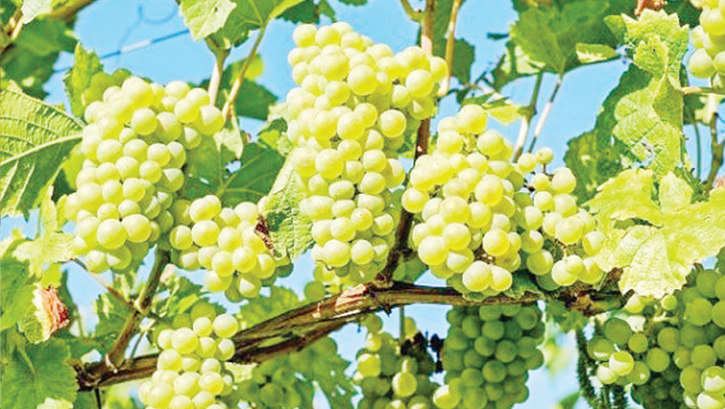
Photo : Messenger
The cultivation of foreign exotic fruits is gradually increasing in the Kurigram district, marking a significant shift in the region's agricultural practices. Among these fruits, grapes have recently gained attention. The grapes cultivated in Kurigram bear a striking resemblance in color and taste to those imported from abroad, indicating the potential for successful domestic production.
If the cultivation of this profitable fruit becomes widespread, it could have numerous benefits for the region. It would not only reduce dependency on imports but also provide economic advantages for local farmers, potentially lifting many out of poverty. Additionally, it would create employment opportunities and satisfy local demand for fruits. The money spent on importing grapes would be saved, thus preserving foreign exchange reserves. The success in Kurigram is already encouraging farmers from other districts to consider grape cultivation.
Asaduzzaman, the Additional Deputy Director of the Kurigram Agriculture Extension Department, stated that the department is closely monitoring the soil and climate conditions in Kurigram to gauge the viability of grape cultivation. If results continue to be promising, steps will be taken to expand grape cultivation across the district.
One notable entrepreneur, Abu Raihan Farooq, from Belgacha Union in Kurigram Sadar Upazila, has established an impressive orchard on his 23-bigha land. His garden boasts a variety of fruit trees, including hundreds of grape varieties alongside oranges, apples, mangoes, and other local and foreign fruits. Upon entering the garden, visitors are greeted with an array of colorful grape varieties such as Red Rose, Halloween, Baikanur, Green Long, Iceberg, and Supernova hanging on the vines. Farooq began experimenting with grape cultivation in 2022 on one bigha of land. The successful yield prompted him to expand to two bighas the following year. He now harvests over 40 varieties of grapes, which are sold for 400 to 500 taka per kilogram in the current season. Additionally, he has sold grape seedlings worth approximately one lakh taka. His garden attracts many farmers and visitors from both within and outside the district.
Similarly, Ruhul Amin, a farmer from Gangarhat village in Fulbari Upazila, has successfully cultivated Russian, Ukrainian, and Turkish grape varieties on his two bighas of land. His garden also features about 40 different grape varieties.
Farooq shared that his decision to create a mixed fruit garden stemmed from a desire to innovate rather than pursuing traditional employment. His garden includes a diverse range of local and foreign fruit varieties. Two years ago, he started cultivating grapes on one bigha of land, and due to the excellent yield, he expanded to two acres. He aims to sell grape seedlings and fruits worth 5 to 6 lakhs taka this season.
Ruhul Amin also expressed optimism about the future of grape cultivation in Kurigram. He initially grew grapes on one bigha of land and, encouraged by the good yield, doubled the cultivation area to two bighas. He plans to further expand grape cultivation to four bighas in the future.
The increasing interest in grape cultivation in Kurigram signals a promising shift towards diversifying agriculture in the region. If this trend continues, it could significantly benefit the local economy, reduce import dependency, and inspire agricultural innovation across other districts.
Messenger/Fameema








